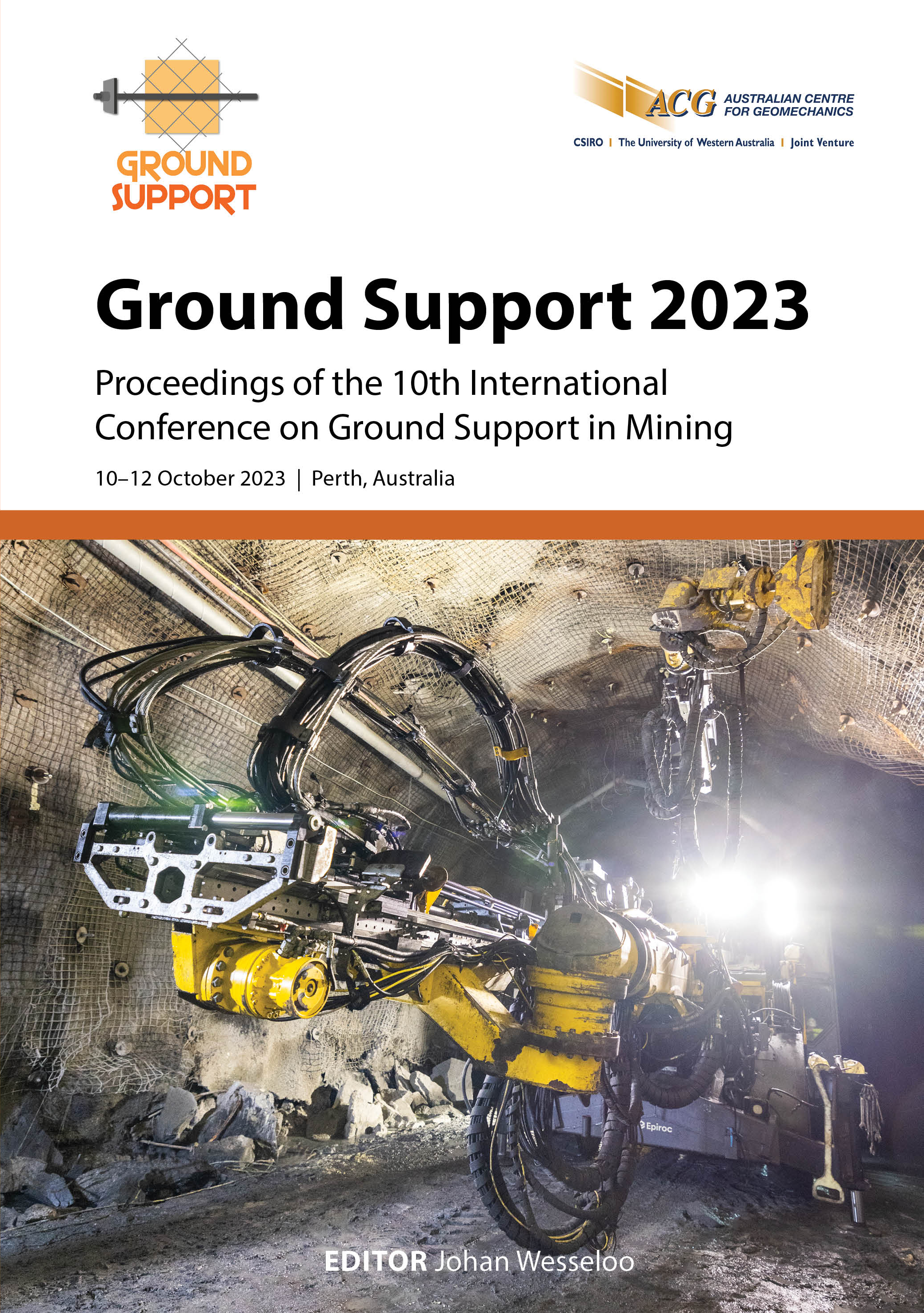Delineation of hazard-based design events for dynamic support system analysis

|
Authors: Dadashzadeh, N; Moreau-Verlaan, L; Kalenchuk, K |
DOI https://doi.org/10.36487/ACG_repo/2325_11
Cite As:
Dadashzadeh, N, Moreau-Verlaan, L & Kalenchuk, K 2023, 'Delineation of hazard-based design events for dynamic support system analysis', in J Wesseloo (ed.), Ground Support 2023: Proceedings of the 10th International Conference on Ground Support in Mining, Australian Centre for Geomechanics, Perth, pp. 165-180, https://doi.org/10.36487/ACG_repo/2325_11
Abstract:
The objective of a dynamic ground support system is to manage excavation damage associated with rockburst events. To achieve this objective, a dynamic support system must be engineered to withstand the unique loading conditions imparted in a high-stress, burst-prone environment. The process of defining those unique loading conditions focuses on identifying the expected failure mechanisms and estimating the expected damage intensity and failure severity to quantify the load demand that may be imparted onto the support system. Identification of the maximum probable ‘design event’ is a critical input parameter for support demand assessments in dynamic ground support system design. Defining dynamic loading conditions unique to probable ‘design events’ requires detailed seismic data analyses. Using a case study from a deep Canadian mine, seismic data analyses are engaged to identify impacting seismic response parameters, which are then applied to seismic domain delineation. Frequency–magnitude trends (and associated b-value analyses) are then evaluated in domained areas to define the ‘design events’. Categorisation of the seismic hazard classes relies on the explicit ‘design events’ which deliver support demand input values necessary for optimising dynamic ground support design. Site-specific seismic data analyses deliver optimum load demand parameters appropriate for achieving an engineered dynamic ground support system design, effectively managing seismic hazard in a safe and economical manner.
Keywords: seismicity, dynamic support, design event, hazard-based design
References:
Butler, AG & Simser, BP 2016, ‘Ground support practice at Glencore's nickel rim south mine – with a link to seismic monitoring data’, in E Nordlund, T Jones & A Eitzenberger (eds), Proceedings of the 8th International Symposium on Ground Support, Luleå University of Technology, Luleå.
Harris, PC & Wesseloo, J 2015, mXrap, computer software, Australian Centre for Geomechanics, Perth.
Hoek, E, Kaiser, PK & Bawden, WF 1995, Support of Underground Excavations in Hard Rock, Balkema, Rotterdam.
Hudyma, MR & Brown, LG 2020, ‘Using seismic data to identify temporal increases in mining-induced stress’, Proceedings of the ISRM International Symposium Eurock 2020 – Hard Rock Engineering, International Society for Rock Mechanics and Rock Engineering, Lisbon.
Kaiser, PK & Moss, A 2022, ‘Deformation-based support design for highly stressed ground with a focus on rockburst damage mitigation’, Journal of Rock Mechanics and Geotechnical Engineering, vol. 14, pp. 50–66,
j.jrmge.2021.05.007
Kalenchuk, K, Dadashzadeh, N & Moreau-Verlaan, L 2023, Dynamic support evaluations for implementation by seismic hazard domains’, in J Wesseloo (ed.), Ground Support 2023: Proceedings of the 10th International Conference on Ground Support in Mining, Australian Centre for Geomechancis, Perth, pp. 197–212.
Morissette, P & Hadjigeorgiou, J 2019, ‘Ground support design for dynamic loading conditions: A quantitative data-driven approach based on rockburst case studies’, Journal of Rock Mechanics and Geotechnical Engineering, vol. 11, pp. 909–919.
Wesseloo, J 2018, ‘The spatial assessment of the current seismic hazard state for hard rock underground mines’, Rock Mechanics and Rock Engineering, vol. 51, no. 6, pp. 1839–1862.
© Copyright 2026, Australian Centre for Geomechanics (ACG), The University of Western Australia. All rights reserved.
View copyright/legal information
Please direct any queries or error reports to repository-acg@uwa.edu.au
View copyright/legal information
Please direct any queries or error reports to repository-acg@uwa.edu.au
